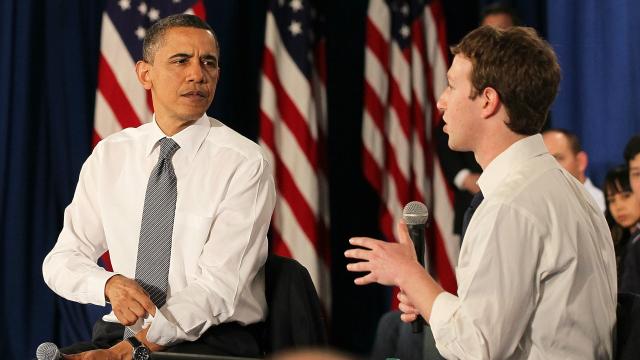After a fake story once again made the rounds on Facebook over the weekend, Barack Obama today name-checked the social network while talking about the spread of lies this election season.
Obama and Zuck at a Facebook town hall in 2011. Image: Getty
“The way campaigns have unfolded, we just start accepting crazy stuff as normal and people if they just repeat attacks enough and outright lies over and over again,” Obama said at a rally in Ann Arbor, Michigan. “As long as it’s on Facebook, and people can see it, as long as its on social media, people start believing it, and it creates this dust cloud of nonsense.”
Obama’s statement underscores something that’s been clear for years and that doesn’t have an obvious solution: Facebook has a fake news problem. False things being spread on the internet isn’t exactly a new phenomenon, but The Social Network’s share-thirsty algorithm has made it much easier for blatantly made-up stories from invented publications to spread faster and wider than ever before.
The problem has been seemingly getting worse since Facebook fired the human curators for its trending news section, and let the feature be completely controlled by an algorithm. This past weekend it surfaced a bogus story by the non-existent Denver Guardian in the US, but the problem has been endemic in recent months. Almost immediately after firing curators, the social network trended a false story saying saying Megyn Kelly was in big trouble at Fox News (she wasn’t). The Washington Post reports that in September, Facebook trended a story from a fake organisation called the “Association of American Physicians and Surgeons”, and also featured a story saying the September 11 attacks were a “controlled demolition”.
Of course, Facebook’s not alone in spreading fake information. Last week, Buzzfeed reported the spread of tweets that appeared to show the Clinton campaign encouraging people to vote by text, which isn’t possible. Twitter deleted the posts and CEO Jack Dorsey said he was “not sure how this slipped past us”.
Jim Rutenberg at The New York Times has a nice roundup of just some of the fake news stories that have circulated on both Facebook and Twitter:
In the last couple of weeks, Facebook, Twitter and other social media outlets have exposed millions of Americans to false stories asserting that: the Clinton campaign’s pollster, Joel Benenson, wrote a secret memo detailing plans to “salvage” Hillary Clinton’s candidacy by launching a radiological attack to halt voting (merrily shared on Twitter by Roger Stone, an informal adviser to the Trump campaign); the Clinton campaign senior strategist John Podesta practiced an occult ritual involving various bodily fluids; Mrs. Clinton is paying public pollsters to skew results (shared on Twitter by Donald Trump Jr.); there is a trail of supposedly suspicious deaths of myriad Clinton foes (which The Times’s Frank Bruni heard repeated in a hotel lobby in Ohio).
Rutenberg says that fake news is the “media’s next challenge”, and he’s probably right. What are traditional news outlets supposed to do about fake stories perfectly crafted to garner likes and shares, thus being propelled by Facebook’s immensely powerful algorithm to the top of millions of people’s news feeds? Some computer scientists even doubt that Facebook would be able to properly tackle the problem of fake news at all. If the last few months are anything to go by, that’s certainly true. It’s election eve and this crap keeps happening.
Facebook did not reply to a request for comment.
